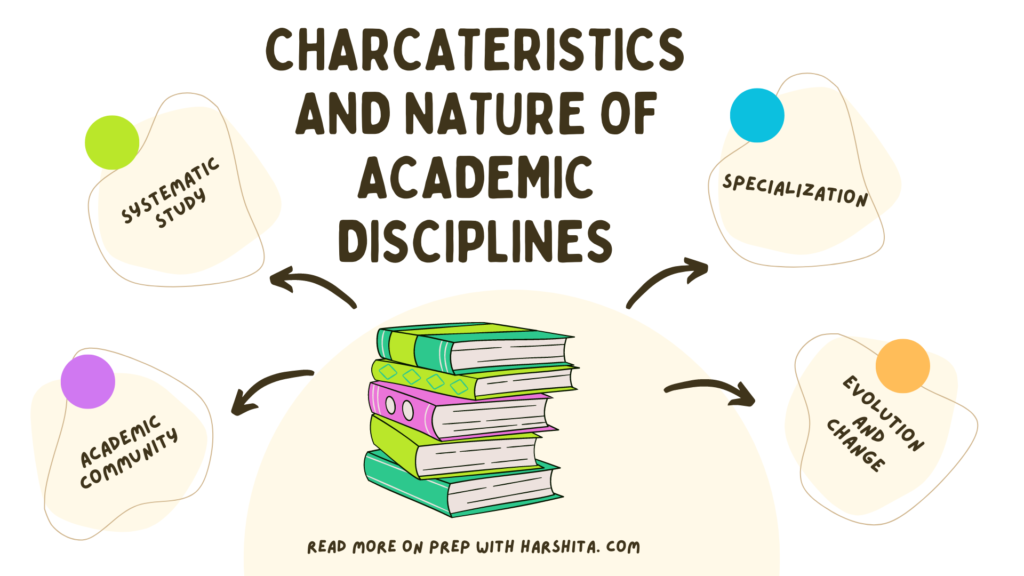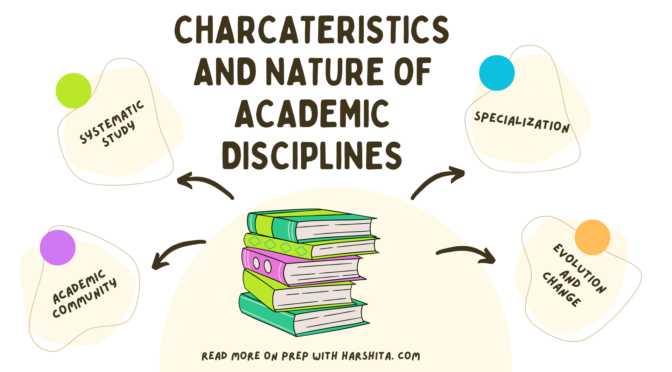The characteristics and nature of academic disciplines can vary across different fields of study, but there are several common features that define them.
Here are the key characteristics and nature of academic disciplines:
- Systematic Study: Academic disciplines involve the systematic study of a specific subject matter. They provide a structured framework for organizing knowledge, theories, concepts, and methodologies related to a particular field of study. Disciplines aim to develop a deep understanding of their subject matter through rigorous inquiry and research.
- Specialization: Disciplines often encourage specialization, allowing scholars to focus on a specific area within the broader field. Specialization enables scholars to develop expertise in a particular subfield, leading to in-depth knowledge and the ability to make significant contributions to the discipline. As knowledge advances, disciplines can further subdivide into specialized sub-disciplines.
- Methods and Approaches: Each discipline adopts specific methods and approaches to investigate and analyze its subject matter. These methods can include experimental research, statistical analysis, qualitative inquiry, theoretical frameworks, fieldwork, modeling, or other approaches tailored to the discipline’s specific needs. The chosen methods reflect the nature of the subject matter and the research questions being addressed.
- Body of Knowledge: Disciplines develop a distinct body of knowledge over time. This body of knowledge includes established theories, concepts, principles, empirical findings, and research methodologies that have been accumulated through scholarly endeavors. The body of knowledge serves as the foundation for further exploration, application, and advancement within the discipline.
- Academic Community: Disciplines are characterized by communities of scholars who engage in research, teaching, and knowledge exchange within the field. Scholars within a discipline form a professional community that shares common interests, methodologies, and goals. This community promotes collaboration, intellectual discourse, peer review, and the dissemination of research findings.
- Peer Review: Scholarly work within academic disciplines undergoes a rigorous peer review process. Researchers submit their work to academic journals, conferences, or other scholarly platforms, where it is critically evaluated by experts in the field. Peer review ensures the quality, validity, and rigor of research, and contributes to the growth and advancement of knowledge within the discipline.
- Theoretical Frameworks: Disciplines develop and refine theoretical frameworks or paradigms that guide research and understanding within the field. These frameworks provide conceptual models, principles, and theories that shape the research questions, methodologies, and interpretations within the discipline. Theoretical frameworks provide a lens through which scholars analyze and make sense of their subject matter.
- Interdisciplinary Connections: While disciplines have their own specific focus, they often intersect and overlap with other disciplines. Interdisciplinary connections emerge when scholars draw on insights, theories, and methodologies from multiple disciplines to address complex research questions or societal issues. Interdisciplinary collaborations can lead to new perspectives, innovative approaches, and holistic understanding.
- Evolution and Change: Disciplines are not static; they evolve and change over time. New discoveries, advancements in technology, shifts in societal needs, and interdisciplinary collaborations can influence the direction and development of disciplines. Disciplines continually adapt and evolve to incorporate new knowledge, theories, and methodologies.
- Impact on Society: Academic disciplines have a broader societal impact beyond the academic realm. They contribute to the development of practical applications, inform policy-making, drive innovation, and address societal challenges. Disciplines play a vital role in advancing knowledge, improving understanding, and shaping various aspects of society.
In summary, academic disciplines are characterized by systematic study, specialization, specific methods and approaches, a distinct body of knowledge, scholarly communities, peer review, theoretical frameworks, interdisciplinary connections, evolution, and societal impact.
These characteristics collectively define the nature of academic disciplines and guide the pursuit of knowledge within specific fields of study.
Also Read : Teacher Subject Knowledge and Disciplinarity

Also Visit : Prep with Harshita

